
Here’s a comprehensive review of Benzylpenicillin (also known as Penicillin G), a natural penicillin antibiotic used to treat a wide range of bacterial infections:
Description:
Benzylpenicillin (Penicillin G) is a narrow-spectrum antibiotic in the penicillin class that works by inhibiting bacterial cell wall synthesis, which leads to bacterial death. It is particularly effective against Gram-positive bacteria and some Gram-negative organisms.
Brand Names:
- Pfizerpen
- Crystapen
- Pentids
- PenG
- Penicillin G Sodium
Available Forms & Strengths:
- Injection (IV/IM): Available as powder for reconstitution in various strengths, including:
- 600 mg (1 million IU)
- 1.2 g (2 million IU)
- 3.0 g (5 million IU)
- 6.0 g (10 million IU)
Uses:
Benzylpenicillin is used to treat various serious bacterial infections, including:
- Bacterial Meningitis: Caused by susceptible strains of Neisseria meningitidis, Streptococcus pneumoniae, and Haemophilus influenzae.
- Syphilis: Treponema pallidum infections.
- Endocarditis: Caused by Streptococci, Enterococci, and Staphylococcus species (if penicillin-susceptible).
- Anthrax: Bacillus anthracis infections.
- Severe Streptococcal Infections: Such as necrotizing fasciitis, erysipelas, and other soft tissue infections.
- Pneumonia: Especially caused by Streptococcus pneumoniae.
- Sepsis (Septicemia): Particularly when caused by penicillin-sensitive organisms.
- Diphtheria: Caused by Corynebacterium diphtheriae.
- Clostridial Infections: Such as gas gangrene and tetanus.
Side Effects:
- Allergic Reactions: Urticaria (hives), rash, and severe allergic reactions like anaphylaxis.
- Gastrointestinal Issues: Nausea, vomiting, diarrhea.
- Injection Site Reactions: Pain, inflammation, or thrombophlebitis (inflammation of a vein).
- Hematologic Effects: Hemolytic anemia, leukopenia, thrombocytopenia, and prolonged bleeding time in rare cases.
- Electrolyte Imbalance: High doses of IV penicillin can lead to hyperkalemia (due to the potassium salt of penicillin) or hypernatremia (due to sodium content).
- Neurotoxicity: High doses, especially in patients with kidney impairment, can cause seizures, confusion, and encephalopathy.
Dose:
- Adults: Dosing varies widely depending on the infection being treated, with doses typically ranging from 1.2 to 6 million units every 4-6 hours. Higher doses (up to 20-24 million units/day) may be required for severe infections like endocarditis or meningitis.
- Children: Dosed according to weight, with typical pediatric doses ranging from 50,000 to 300,000 units/kg/day divided into multiple doses.
- Duration: Varies by infection type. For example, in syphilis treatment, a single dose may be sufficient, while endocarditis may require prolonged treatment (4-6 weeks).
Contraindications:
- Hypersensitivity to benzylpenicillin or other penicillin-class antibiotics.
- Patients with a history of severe allergic reactions (e.g., anaphylaxis) to beta-lactam antibiotics (including cephalosporins) should avoid penicillin.
Drug Interactions:
- Probenecid: Inhibits the renal excretion of penicillin, leading to higher blood levels and increased risk of toxicity.
- Methotrexate: Co-administration may increase methotrexate toxicity, as penicillin reduces its clearance.
- Aminoglycosides: Penicillin and aminoglycosides should not be mixed in the same IV solution due to physical incompatibility. However, they can be used concurrently for synergistic effect in treating certain infections (like endocarditis).
- Oral Contraceptives: Penicillin may reduce the efficacy of hormonal contraceptives, so additional contraceptive measures should be considered.
Warnings:
- Anaphylaxis: This is the most serious risk associated with penicillin use, and it can be life-threatening. Immediate discontinuation and emergency treatment are required in case of anaphylaxis.
- Neurotoxicity: High doses in patients with renal impairment may cause seizures. Monitoring and dose adjustments are crucial in such cases.
- Electrolyte Imbalance: IV formulations of penicillin contain significant amounts of sodium or potassium, which may exacerbate conditions like heart failure, hypertension, or kidney disease.
Special Considerations:
- Pregnancy: Penicillin G is classified as Category B. It has been widely used in pregnant women without evidence of fetal harm and is considered safe during pregnancy, particularly for the treatment of syphilis.
- Breastfeeding: Penicillin G is excreted in small amounts in breast milk, but it is generally considered safe for use in nursing mothers. However, infants should be monitored for allergic reactions or gastrointestinal disturbances.
- Renal Impairment: Penicillin is primarily excreted via the kidneys, so dose adjustments are necessary in patients with kidney dysfunction to avoid accumulation and toxicity.
Doctor Advised:
It is crucial to complete the full course of treatment, even if symptoms improve, to prevent the development of bacterial resistance. Before starting penicillin therapy, patients should inform their doctor about any known drug allergies, particularly to penicillin or other beta-lactam antibiotics. Close monitoring may be required for those with kidney disease or electrolyte imbalances.
Conclusion:
Benzylpenicillin (Penicillin G) is a highly effective antibiotic for treating a wide range of bacterial infections, particularly those caused by Gram-positive organisms. Its well-established safety profile makes it a first-line treatment for certain infections, including syphilis and bacterial endocarditis. However, its use must be carefully managed in patients with allergies or renal impairment, and patients must be monitored for potential allergic reactions or electrolyte disturbances.







